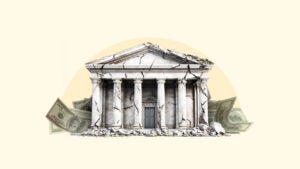What to do if a bank rejects you for a checking account

Key takeaways
- If you’ve been rejected for a checking account, you can request a copy of your banking records to see why.
- You can also look into second-chance checking accounts. These accounts are designed for those whose banking history may prevent them from opening a standard account.
Banks and credit unions may run a bank history report on you when you apply for an account. If you get rejected after applying for a new checking account, it’s likely because of information that was revealed in this report.
If this happens to you, you should first confirm that the information on your initial application was accurate, and from there you can review your consumer reports and apply for a second-chance checking account.
Confirm the information in your application
Start simple. Review the application you submitted with the bank to confirm all the information is accurate. If you accidentally gave the wrong social security number or made a typo, this could have resulted in a denial.
Review your consumer report
If information in your application wasn’t the problem, you can move on to reviewing your consumer report. Banks use specialty consumer reporting agencies, such as ChexSystems, to see your banking history when reviewing your application.
If a bank rejects your application because of issues in your banking history, it is required to provide you with a notice that includes the name and contact information of the company that provided the negative bank history information.
You have access to this data, too.
The Fair Credit Reporting Act allows you to request a free report once every 12 months or when you get an “adverse action” notice, such as a rejection.
Make sure to look for errors in your report so that you can have them corrected. Just like with a credit report, if you find any errors, you have the right to dispute them. You can dispute information by filing a dispute directly with the reporting company.
Consider a second-chance checking account
Some banks offer second-chance checking accounts, which are accounts you can open even with a negative banking history. These accounts generally have more limitations and fees than standard accounts. For example, they may not come with checks or overdraft protection.
But a second-chance program can be a good option for rebuilding your banking history. You may be able to qualify for a standard checking account after six to 12 months of using the second-chance account without any negative activity.
Keep your money safe by opening your checking account at an institution that’s insured by the Federal Deposit Insurance Corp. (FDIC) or a credit union that’s insured by the National Credit Union Administration (NCUA).
Bottom line
Getting rejected for a checking account due to a negative banking history can be difficult news, but it doesn’t mean you have to be unbanked. There are plenty of second-chance account options to explore, so you can store your deposits somewhere, demonstrate good financial behavior and get closer to approval for a standard checking account.
FAQs
Why we ask for feedback Your feedback helps us improve our content and services. It takes less than a minute to complete.
Your responses are anonymous and will only be used for improving our website.
You may also like

Can you get a balance transfer card with bad credit?

What happens when a bank fails?




